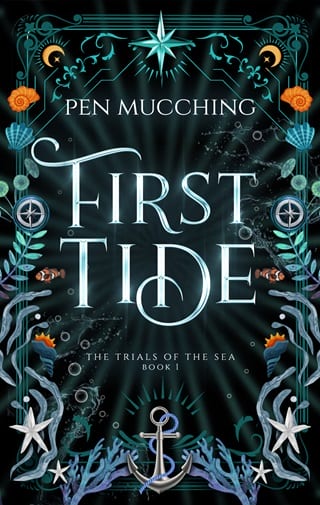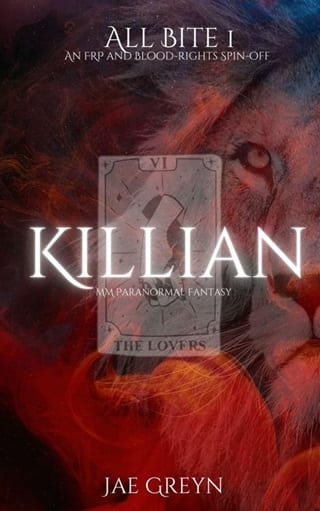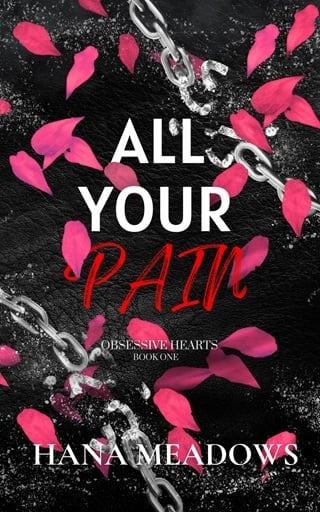37. Fabien
37
Fabien
T he whole crew’s celebrating. Even Ridley, who hasn’t so much as sipped anything harder than water since the last drink he shared with my father, is cradling a full pint. All because Zayan’s going to make it.
And I’ll be damned if I don’t feel something myself. Not happiness, not that. But… something close.
“Don’t lie,” Vinicola says, bouncing up beside me with a grin that’s wide as the sea. He tries to shoulder-bump me but only ends up brushing against my arm, like some overeager, oversized dog who’d be just as happy slinking up to anyone else.
I eye him, flatly. “I’m not lying.”
But I am lying to him. Whatever satisfaction is brewing in me, it’s got something to do with relief over Zayan. It touched me. A deep part of me I thought long buried.
“You are,” he insists, like he’s got a sixth sense. “I can see it as clear as day: you’re happy he didn’t die.”
I let out a short, humorless laugh. “Couldn’t care less if he died or not. All that matters is we’re still four for the Trials. It’s the number that counts, Vinicola, not the man. If he died, we’d be worse off.”
“But he didn’t die,“ Vinicola murmurs, “and you’re happy .”
I scoff, trying to brush off his words, but they linger in the air between us, like someone vomited and it hasn’t aired out yet.
“You’re projecting,” I mutter, folding my arms and turning to the dimly lit shadows of the ship’s lounge.
The celebration roars around me—laughter, clinking glasses, voices swelling into a chaotic hum that grates like broken glass. It’s all so loud, so mindlessly cheerful, and I’m caught in it.
My hand brushes against my coat, where the hourglass sits. There’s something carved inside—an inscription, twisted into the glass. I don’t know what it says yet, but my entire body is aching to get away from here, hide myself somewhere quiet and peaceful, and decipher the meaning.
But I stay, bound by this pesky happiness, I’m still hanging around.
That cripple Zayan turned out to be more than his limp, saving the day in a way none of us could’ve. He even saved me, for fuck’s sake.
“Yeah, I kind of know you already, okay?” Vinicola pipes up beside me, his voice so light it practically dances over the noise. “I’ve studied your expressions. I know when the grump is real and when it’s just a mask.”
I don’t respond right away, the words sticking in my throat like dry bread.
Studied me, has he? I knew he’d be insufferable the moment he opened his mouth, but this level of probing—the insistence on understanding me—is a new, special breed of irritation.
“Think what you will,” I say with a shrug. “But whatever emotion you think you see, it’s disgust. Because I’ve had to sit through the hero and the captain fucking. Again. That’s it.”
Vinicola raises an eyebrow, his smirk fading just slightly, his eyes narrowing as he studies my face. I can practically feel him picking my words apart, trying to figure out if I’m serious or just throwing him a bone to chew on. Truth is, it’s both. There’s a twisted satisfaction in tossing something out there to keep him guessing. Keeps his meddling little mind busy.
How’s that for knowing me? Good luck figuring that one out.
“Nah, when you’re disgusted, you crinkle the corner of your mouth,” he says, leaning in with that same infuriating curiosity. “This? This isn’t it.”
Oh, for fuck’s sake.
“Don’t you have something better to do?” I snap, narrowing my eyes. “Go write some songs, or irritate someone else for a change.”
He only holds up his hands in surrender, still grinning. “Alright, alright, no need to get prickly. I get it. Your comfort zone’s particularly sacred. Consider me gone.”
Finally, he turns back to the drinking crowd, and I take a deep breath. Good riddance. But no—I don’t let the relief show. I just fold my arms, keeping my gaze on the crew, pretending he never even got to me in the first place.
We’re still inside the gateway, and I chose to stay here for a reason. Ironically, it’s safer on this side, under the Lady’s twisted watch, than out there where my own history leaves us exposed to too many unseen threats. Here, we’ve satisfied her demands—completed whatever trial she set for us—so there’s no reason she’d toss us out now. Not unless someone screws up.
Besides, no one dares to touch the compass besides Gypsy and Vinicola. It’s an unspoken rule by now. The damned thing revealed itself to them, and that’s how it stays. Gypsy, from the moment she dragged it away from that vendor, and Vinicola, when he dug it out of the sand. The two of them are the only ones the goddess tolerates as guides, for whatever twisted reason.
It seems fair to respect it.
Just as I’m letting my mind settle back into a semblance of peace, Vinicola’s voice sneaks in again. “You know, I don’t think they’re coming back from the captain’s quarters any time soon. So if that’s what you’re waiting for…”
Relentless. The man’s a walking plague, like a sore that keeps festering. After all this time, I don’t have the energy to keep up the deflections, to keep the usual wall up. The truth is, he’s just so fucking…persistent that he tires me out.
“Why the hell would I be waiting for them?” My voice drops to a low growl, tired but thick with warning. Anyone else would feel the chill. Anyone but him.
He doesn’t even flinch. Instead, he just grins, undeterred, leaning in. “Because,” he quips, almost gleeful, “you want to apologize, don’t you?”
I nearly choke on my own breath. Apologize? Me?
I fix him with a hard stare, hoping the silence will knock some sense into him, but he only smiles wider, entirely too pleased with himself.
“Excuse me?” I breathe out.
“You know, after all that talk you had with Miss Captain before we got here? Then holed yourself up in the armory without a word?”
My expression darkens, my patience wearing thinner than threadbare canvas. “Apologize?” I repeat, practically spitting the word. It doesn’t belong in my mouth, not with the way I live. Apologies have never mattered, and they sure as hell don’t now. I don’t answer to anyone.
And yet—damn it—a small fracture stirs inside, just enough for me to catch myself lingering, not yet turning away. There’s truth in the accusation, a shadow of something I can’t quite banish. I know I’ve been a bastard to Gypsy and the others. Purposefully. I chose that. But still… Zayan saved my life.
“You do know what the word means, don’t you?” Vini chuckles.
I blink at him, feeling something unfamiliar clawing up my chest. Shame? No, that can’t be it.
“That’s it. I’m leaving,” I mutter, already pivoting, my shoulders tense. I need silence, a void—a place to reset. But I don’t make it two steps before he speaks up again, his voice softer now, without the usual teasing edge.
“Where are we going?” he asks. “To the armory?”
We ?
I pause but don’t look back, my feet rooted despite everything. I can’t seem to shake him, no matter how hard I try.
The armory is supposed to be my sanctuary, the one place left on this cursed ship where I could have some quiet. With the captain’s quarters turned into neutral ground and Ridley’s company far too familiar, the armory had become my last retreat.
“ I am going to the armory,“ I say, making it crystal clear it’s only me going. “You, however, are going anywhere else.”
Without waiting for a reply, I start walking again.
I set a brisk pace, but his singsong voice trails after me. “You can’t call dibs on a common room, Mr. Madman. What if I suddenly need a pistol? Didn’t you say we’re free to take whatever we want from there? “
“I’m sure whatever you think you need it for can wait,” I grunt. But even as the words leave my mouth, I know I’m losing the battle. Throwing him overboard or shutting him up with a well-placed punch is an entertaining thought.
Though, oddly enough, I don’t think he actually deserves that.
“For what I want it for, it can’t,” he chirps.
“Hm.”
When we reach the armory, I push open the door and step inside, the sharp, metallic scent of oil and iron filling the space. I ignore Vinicola trailing behind as I go straight to the workbench and set the hourglass down with a solid thud, my fingers already tracing its edges.
“Go ahead, look for that gun you keep prattling about,” I say, not bothering to look up. But he just hovers, circling me left to right, always with his eyes on my hands. “Suit yourself, then.”
The hourglass is crafted with a precision only a goddess could manage—a delicate thing that shouldn’t survive a simple breath of air. The glass, as thin as a whisper, seems like it’d shatter with the barest touch. But it doesn’t. It’s tougher than it looks, a sturdy little thing.
I run my fingers over every edge, every etched line, twisting and turning it to inspect each inch.
“Why letters inside?” Vinicola’s voice breaks in, leaning in close enough I can feel his breath, and it grates.
“I don’t know,” I mutter, irritated, but honest. No matter how I turn it, the signs inside don’t make sense. They shift, flickering, looking different under each angle.
But I’m not about to give up. Patience has been drilled into me, layer by relentless layer, since the day I washed up on that desert island as a kid. If anything, this hourglass feels like a reminder of all the years I’ve clawed through, each second devoted to making me a patient man.
Those first years back home, I was just a scavenger—a kid ransacking knowledge from every pit and ruin, pouring my parents’ money into an impossible scheme no sane person would touch. I learned from people who would slit my throat without blinking, piecing together every clue, every tale, every cursed scrap about the Lady. For years, my studies were long nights and foreign books, names of the dead, whispers of rituals.
And then, the decade after? It’s been an obsession. My body became a weapon, tuned to handle any threat, anyone with knowledge or power. Every inch of me sharpened to one purpose: to kill her. The Lady. That bitch. This trial is just another step, another wall to smash through.
So, no—a glass bauble and Vinicola’s wide-eyed wonder aren’t about to throw me off.
I’ll decipher its riddle, even if it takes all night.
But hours drag on, with Vinicola slouched on the workbench next to me, his voice so hollow it sounds like it’s coming from the bottom of a well. And I still don’t manage to crack it.
Vinicola yawns, rubs at his eyes, and stares at the hourglass. I lean back, arms crossed, trying to ignore him. But then he clears his throat, interrupting my thoughts.
“Alright, let’s recap. Maybe that’ll help.” His words come sluggish.
“Fine,” I say, jaw tight.
“So, when we crossed the gateway, there was nothing in the water,” he drawls, rubbing his temple. “Like the hourglass was flipped, making the sea pour out. Then, it flips again, and suddenly the sand’s multiplying, so we start running like madmen, right?”
“Right.”
“But then…” He pauses. “It flipped again on its own.”
I sigh, biting back the urge to tell him to go sleep it off somewhere far from here. “Yes.”
“We didn’t do anything,” he adds.
“Nope,” I reply, keeping my voice flat.
“So what does it tell us?” He lifts his head, clearly straining, brow raised like he’s waiting for a revelation. I stare back, half-expecting him to actually say something worth the wait. But no—he just looks at me, a hopeful gleam in his eye, as if I’ve got the answer locked away somewhere I just haven’t bothered to check.
I cock my brow, gaze steady, waiting. “What does it tell us?” I finally prompt, when it’s clear he’s not going to figure this out himself.
His look of forced wisdom melts into a groan, loud and tortured enough to make my teeth ache. “I don’t know!” he whines, letting his head drop back. “I have no clue.”
He slumps against the workbench, staring at the ceiling, probably praying for some kind of epiphany that won’t come. Eventually, he just flops down and stares at the hourglass again, as if it might start speaking to him.
Fine. If he’s not going to get anywhere, I might as well try everything else, no matter how little hope I have in it.
I grab a piece of paper and turn the hourglass, sketching down the rough lines of what I see. It’s nothing coherent—just an hourglass in a shaky outline, more like a child’s scratchings than anything worthwhile. But at least it’s something to show for the last five minutes of listening to him ramble.
Then, of course, Vinicola’s voice cuts through my thoughts. Again.
“But you know what?” he says, eyes wide, voice soft and stupid. “This thing looked really beautiful in the sun.”
“What?”
I don’t know what he’s talking about.
“You don’t remember? The way it caught the light? It was spectacular—like it was made to catch the sun just right,” he goes on, staring at the hourglass as if he’s still hypnotized by it. “The light bounced off it like nothing I’d ever seen before. And this entire Trial—“
“It wasn’t a Trial,” I cut in.
“Fine,” he relents, unfazed, “call it whatever you like. But it was terrifying and magnificent. I never thought I’d see water swallowing the sand like that or feel the ground breathe beneath my feet.”
“Hm,” I voice, listening to his rambling only half-tuned in.
I grunt, only half listening. Vinicola rarely speaks with any sense, his words flowing on and on like a stream with no destination. But this time, he’s mentioned something that hits a nerve, making me sit up a little straighter.
The hourglass was made to catch the sun just right?
Slowly, I pick up the hourglass, turning it over in my hands. I hold it up to the lanterns flickering in the armory. The dull, muted glow barely does anything, but I can almost picture it—how it might gleam in daylight, almost like…
I shake my head, muttering to myself, “Maybe you’re not as useless as you look...”
Vinicola practically springs up, his enthusiasm bouncing back tenfold. “You see? I told you! It was like stepping into another world! Show me anyone else who’s had the privilege to see something like that, and I’ll eat my quill! Sure, it was terrifying, but I feel—“
“That’s not what I meant.” I cut him off, unwilling to let his excitement spiral further. “The hourglass… it was designed to catch the sun. That’s the point.”
He stops mid-sentence, his eyes widening as he processes what I just said. “That’s… That’s the point?”
“We need sunlight,” I say, rising from the chair abruptly. It tilts dangerously, and Vinicola catches it before it clatters to the floor. He scrambles to his feet, trailing after me as I make for the deck.
“O-Okay,” he stutters, standing up as well and following me close by as I storm out of the armory.
The sun’s still got an hour or two left before it drops entirely. That gives us time. We might have wasted half the day on this cursed gateway, but we still have time of day.
We reach the deck just as the sky is painted in fading colors of fire, the sun low. The crew’s still in high spirits, laughter rolling across the ship, and Ridley, on his second drink, raises his bottle in silent toast as I pass, but I don’t return the gesture.
I walk straight to the bow, where the last of the sunlight cuts sharp and clear, and hold the hourglass up to the light. Vinicola’s at my elbow, almost vibrating with anticipation, eyes fixed on the glass.
For a moment, nothing happens. The hourglass glimmers faintly, catching the light, but the strange signs inside remain as incomprehensible as ever. My heart sinks, frustration bubbling up. Was this another dead end?
But then, as the sun dips lower, the angle of the light changes, and suddenly, the hourglass flares with a brilliant glow. The inscriptions inside begin to shift, rearranging themselves into a coherent pattern. It’s like watching a puzzle piece itself together in mid-air.
Vinicola lets out a gasp. “It’s… it’s working!”
I don’t respond, too focused on the hourglass as the symbols morph into something readable. The letters align, forming words that had eluded me for the past couple of hours. My breath catches in my throat as the message becomes clear:
“The sun warms me, but it doesn’t move me. Keep looking, little champions.”
I could laugh. Hell, I could almost break something right now. That bitch...
All the years I’ve searched for a way to defy her, and the Lady has spoken to me only once—right after I crawled out of the gateway as kid, exhausted and alone.
She marooned me on an empty island after my parents died, with nothing but coconuts and one miserable type of fish for ten years. I was her toy, and she watched, silent and smug. Then, one day, she spoke right inside my skull: I free you , she said, like I should thank her for it.
Now, I might not be hearing her voice directly in my head, but I know it’s her message alright. The bile rises in my throat as I imagine her whispering the words the hourglass spells out. Little champions . I grit my teeth against the disgust, fighting the urge to smash the damn thing.
“The sun isn’t the answer,” I finally manage, my voice thick with rage.
“What do you mean? The sun made the hourglass react—“
“But it didn’t reveal anything useful, did it?” I cut him off, unable to keep the fury from my tone. This message is just another one of her twisted games, meant to lead us in circles, to toy with us. This is exactly how she operates. “She says the sun doesn’t move her. Does that sound like the sun’s the key? No.”
“Oh. Okay,” he mutters, glancing down, his hand drifting through his blond hair. “No need to get worked up, though, right? I mean, the sun doesn’t move the Lady. It’s just… a fact. And we got something out of it—another piece of the clue.”
The dull ache in my jaw reminds me to unclench my teeth. He doesn’t get it—none of them do. They’re not the ones she’s spent years torturing.
“Yeah, some clue,” I snort. The bitterness claws its way out. “What a fucking joke. I didn’t need her words to know what moves her, Vinicola. I’ve known all along. It’s cruelty. She doesn’t move for anything but that. She feeds on human suffering.”
Vinicola’s gaze lifts, his eyes holding something unreadable. He crosses to the railing, leans against it, and lets silence fill the space between us. After a beat, he mutters under his breath, almost like he’s talking to himself. “Cruelty moves most who can feel pain.”
I narrow my eyes at him, suspicion sparking. “What are you? Empathizing with her?”
He shrugs, his gaze lost somewhere on the horizon. “I’m just saying, if pain resonates with her, it means she knows what it is. And if she’s felt pain before, it means she can feel it again.” He turns slightly, his voice barely above a whisper. “Isn’t that what you want?”
The question hangs there, hovering between us. The words settle, twisting, and before I can stop myself, I let out a low, harsh laugh.
A cold spark flickers to life.
“Of course, I want her to feel pain,” I admit, the bitterness raw. I’ve wanted it a thousand times over, imagined it in ways that would make even the darkest hell blush.
He nods as if he understands, a ridiculous notion in itself. “Then, maybe her cruelty works in your favor,” he says quietly. “If she’s that twisted, maybe she’ll hand you what you want.”
I narrow my eyes. “You think so?”
He tilts his head thoughtfully. “Why do you even think the message was personal? Anyone could’ve read it. Sounds more like praise—‘Keep looking, little champions.’ We tried something she expected, which means we’re close.”
I scoff, trying to gather my thoughts, but they scatter like ashes in the wind.
He gives me a look, softened, like he thinks we’re in this together. “Maybe we both need to step back,” he says, tone maddeningly gentle. “We could ask the others what they think. My mother always said, ‘When in doubt, ask your neighbor.’ Four heads might be better than two, don’t you think?”
I just stare, biting back the words at the tip of my tongue.
He shrugs, smiling faintly, as if he’s hinting at some meaning I’ve overlooked. “Not that I meant it… like that.”
It takes me a beat too long to catch his double entendre. The feeling of shame returns again.
 Fullepub
Fullepub 



